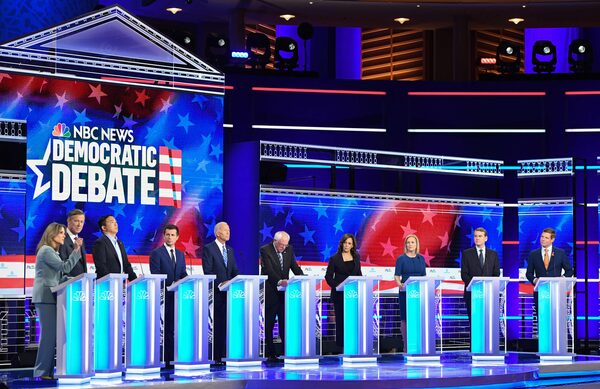
The crowded field of presidential candidates are desperate to gain recognition, traction in this week’s televised debates.SAUL LOEB/AFP/Getty Images
With the testimony of special counsel Robert S. Mueller III behind them, with the 2020 presidential campaign dominating the political conversation here in the site of the first presidential primary, and with 20 contenders girding for this week’s twin set of debates, the Democrats are struggling with the pre-eminent stubborn truth of American politics: There is no easy way out of the Trump era.
The Mueller report didn’t do it, the 74-year old’s halting Capitol Hill testimony didn’t do it and, despite the fondest hopes of about half the 2020 Democratic candidates, impeachment likely won’t do it, though the topic almost certainly is going to hang over the debates Tuesday and Wednesday nights in Detroit. There, in the Fox Theatre, Democratic White House candidates will seek to outdo each other in expressing outrage over the President’s behaviour, horror over the notion that he was saved from possible indictment by occupying the White House, and disbelief that the very base he repeatedly courts hasn’t perceived his perfidy.
As a result, the two debate sessions being broadcast on CNN present the Democrats with three huge challenges, none of which remotely was met in the first set of debates in Miami late last month:
- How do 20 contenders, plus the candidates who didn’t qualify for the CNN session by attracting sufficient fundraising or support in the polls, set themselves apart from the rest of the field in the limited time they are provided? (Senator Kamala Harris, the star of the last debate, received 12 minutes 16 seconds of time. Senator Kirsten Gillibrand of New York spoke for only 7 minutes 34 seconds.)
- How do the Democrats as a whole present themselves as meaningful alternatives to Mr. Trump when they are so divided on the question of whether to take the party to the left (and achieve longtime party goals such as broader health-care coverage, sturdier protection for abortion, and strong provisions to battle climate change) or to keep it in the safe middle (where proposals to address these priorities are weaker, bow more to the interests of business, and avoid the President’s taunts that the party is flirting with ‘’socialism’’ and that the candidates ‘’hate America’’)?
- How do the candidates handle the impeachment question at a time when the House leadership is still wary of undertaking the procedure – initiated against only three presidents in 230 years, never once successful in removing a president, though Richard M. Nixon resigned in 1974 before he was impeached – and when there is no chance the Republican-held Senate will provide the 67 votes required to send Donald J. Trump packing? (Another obstacle is the congressional calendar. Though the House judiciary committee Friday instigated court action to unseal information from the grand jury Mr. Mueller impaneled – a step prior to beginning potential impeachment proceedings – the House will be in recess until Sept. 9, making it difficult to mount an impeachment effort before the beginning of the election year.)
The result: The Democrats who are seeking the White House are facing the complicated task of appealing to activists who want the President impeached and Obamacare replaced, or supplemented by, a single-payer health care system like that in place in Canada, even as they seek to present an appealing face to the voters who sided with Mr. Trump in the 2016 presidential election but veered into the Democratic column in the 2018 midterm congressional elections and cost Republicans control of the House.
The problem for the Democrats – a flaw in the American system, particularly evident here in New Hampshire, which because of its place at the head of the primaries winnows the field rather than chooses amongst a handful of leading candidates – is that the interests of the party are not congruent with the interests of individual candidates.
The party wants to nominate a candidate who can retake the White House, fill the executive branch with Democratic appointees and chart a path far different from that being blazed by Mr. Trump, himself a one-time Democrat. The individual candidates want to put together a set of voters that will catapult them to the top of the polls among their two dozen competitors, and in a field this big a winning group of voters itself does not have to be very big.
In 1976, former governor Jimmy Carter of Georgia won the New Hampshire primary by winning barely a quarter of the vote – and the field that year consisted only of five candidates. In a field four times bigger than that, a vote somewhere between the 23 per cent that Representative Morris K. Udall took for second place in 1976 and the 15 per cent that Senator Birch Bayh of Indiana took for third place could be sufficient to win the state in 2020.
These tensions will be on display this week, along with some potentially explosive personal conflicts.
In the Tuesday session, Senators Bernie Sanders of Vermont and Elizabeth Warren of Massachusetts, the two leading left-leaning candidates – both from states bordering New Hampshire – will share the stage and bring their struggle for roughly the same group of voters to a national audience.
In the Wednesday session, former vice-president Joe Biden will share the stage with Ms. Harris, his tormentor from June, but also with Senator Cory Booker of New Jersey, who in recent days has joined the Harris offensive over Mr. Biden’s decades-old record on race. Watch for Mr. Booker and Senator Kirsten Gillibrand of New York to jockey to win the sort of breakout moment that propelled Ms. Harris to the front ranks of the Democratic candidates. It may be their last chance.
Our Morning Update and Evening Update newsletters are written by Globe editors, giving you a concise summary of the day’s most important headlines. Sign up today.
 David Shribman
David Shribman